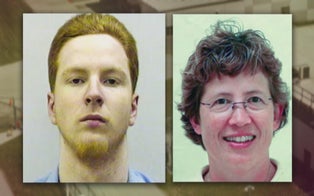His killer died in 2001 while serving a life sentence.
In the early morning hours of June 12, 1963, civil rights leader Medgar Evers pulled into the driveway of his Jackson, Miss., home, where he was shot in the back as he emerged from his car.
The 37-year-old died in a hospital later that morning. He was survived by his wife and three children.
In 1989, Inside Edition spoke to his wife, Myrlie, who recalled the agonizing moment she found her husband.
“The force of that bullet, which is the kind I understand one uses for hunting deer, had hit Edgar in his back, left a small hole, and had torn out his chest," she said. "I ran in the house to call someone — I'm not sure who at this point. I don't know if I was making an attempt to call the police or what."
The activist and field secretary for the NAACP was under constant threat of violence by the Ku Klux Klan and white supremacists and lived in fear of those who opposed his views.
A week after his death, his funeral became a rally for the civil rights movement as Martin Luther King, Jr. led the procession.
Evers, a World War II veteran, was buried at Arlington National Cemetery.
Following his death, a white supremacist named Byron De La Beckwith was tried for Evers’ murder.
Two separate trials, both with all-white juries, failed to convict De La Beckwith with the assassination, due to KKK influence over the jurors, according to reports.
Evidence linking De La Beckwith to the crime included the murder weapon, which had his fingerprints on it.
De La Beckwith was free to live his life. In 1989, he agreed to sit down with Inside Edition for an interview under the condition that the reporter who spoke to him was not black, Hispanic, Asian, Italian or Jewish.
When the reporter originally slated to do the interview could not make it, an African-American Inside Edition producer arrived at his home, where a Confederate flag had been hung over the front porch.
De La Beckwith refused to speak with her and canceled the discussion.
“I am sorry," he said. "I gave specific instructions as to who was to interview me. You are not the person that they were going to send."
In the early 90s, new evidence and public outcry against De La Beckwith's freedom forced the state to reopen the case and retry him.
He stood trial for the third time in 1994, when he was found guilty and sentenced to a life in prison with the possibility of parole in Evers' murder.
De La Beckwith died of heart disease in 2001 at 80 years old.
In 2017, the Medgar and Myrlie Evers Mississippi House was designated a National Historic Landmark.
RELATED STORIES





